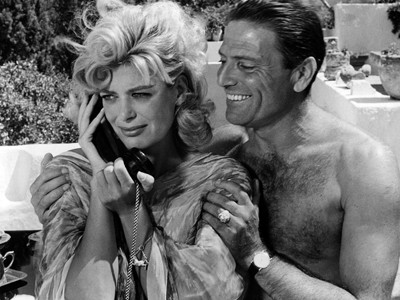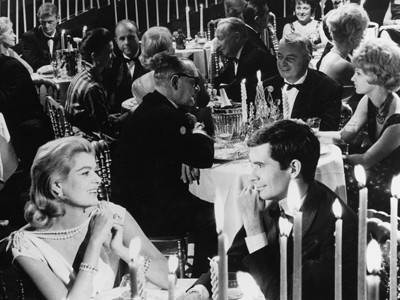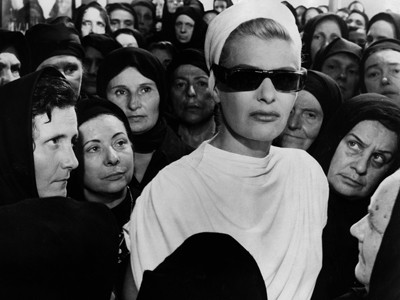| Reviews & Columns |
|
Reviews DVD TV on DVD Blu-ray 4K UHD International DVDs In Theaters Reviews by Studio Video Games Features Collector Series DVDs Easter Egg Database Interviews DVD Talk Radio Feature Articles Columns Anime Talk DVD Savant Horror DVDs The M.O.D. Squad Art House HD Talk Silent DVD
|
DVD Talk Forum |
|
|
| Resources |
|
DVD Price Search Customer Service #'s RCE Info Links |
|
Columns
|
|
|
Phaedra
Olive Films // Unrated // March 21, 2017
List Price: $17.46 [Buy now and save at Amazon]
The Film:
 Modernized adaptations of classic pieces of literature have always been a crapshoot, since their themes and dramatic overtures can get watered down in the updates leveled on the setting. There's something universally impactful about the framework of certain ancient Greek tragedies, however, that transcend the period within which they take place, centered on enduring moral conflicts and malleable story developments that can effortlessly apply to contemporary standards. One of such positive examples is Phaedra, in which Jules Dassin, the mastermind behind Rififi and The Naked City, brings his classic noir mystery sensibilities and build-up to a solemn tale of family turmoil, forbidden passion, and the dangers of becoming obsessed with business. An enlivened, humorously impish performance from Anthony Perkins brightens the otherwise solemn affair, one that's told classically and elevated by stunning visuals, though Dassin's craftsmanship can't quite raise Phaedra above the foreseeable course charted by its tragic intentions.
Modernized adaptations of classic pieces of literature have always been a crapshoot, since their themes and dramatic overtures can get watered down in the updates leveled on the setting. There's something universally impactful about the framework of certain ancient Greek tragedies, however, that transcend the period within which they take place, centered on enduring moral conflicts and malleable story developments that can effortlessly apply to contemporary standards. One of such positive examples is Phaedra, in which Jules Dassin, the mastermind behind Rififi and The Naked City, brings his classic noir mystery sensibilities and build-up to a solemn tale of family turmoil, forbidden passion, and the dangers of becoming obsessed with business. An enlivened, humorously impish performance from Anthony Perkins brightens the otherwise solemn affair, one that's told classically and elevated by stunning visuals, though Dassin's craftsmanship can't quite raise Phaedra above the foreseeable course charted by its tragic intentions.
Working form a screenplay penned by Margarita Lymberaki in which she adapts Euripides' play Hyppolitus into a modern melodrama, Dassin turns the spotlight onto the prestige of Grecian shipbuilder and baron Thanos (Raf Vallone). He's the type of tycoon who thrives off his business ventures and shows great bursts of enthusiasm for his life, yet won't hesitate in abandoning a social situation or individual if an opportunity calls. One of such people he abandons is Phaedra -- played by Dassin's collaboration partner and eventual wife Melina Mercouri -- whom, despite being proposed to on the evening of his latest ship christening, has grown tired and unsatisfied with his constant pursuits and time away. The consequence of yet another of Thanos' business trips puts Phaedra in the position of entertainer and custodian for his son, Alexis (Anthony Perkins), who has himself abandoned his business training for a career in painting and art. Thanos hopes that Phaedra, while escorting him from London to Greece, might convince him otherwise; Alexis, instead, ignites passion in Phaedra, of more than one variety.
Dassin and Lymberaki put their creative gears in motion while adapting the Greek tragedy of Hyppolitus for the modern era, finding ways to work its seaside setting and disquieting subject matter into a functional contemporary tale. To do this, they've also resorted to the pitfalls of classic Hollywood exposition in getting across Thanos' aspirations and to emphasize the rationale behind Phaedra's sullen demeanor. By design, the story's introduction launches with tonal iciness and obscurity hinged on how these characters harbor unappealing facets within their personalities, and in combination with this rigidly-introduced exposition, the beginning of Phaedra weighs down the drama from the moment it leaves port. There's adventurousness and attractiveness to be found in how Dassin captures the bittersweet glances between Thanos and Phaedra with a huge engagement ring separating them, yet it's built for curiosity over how Phaedra handles neglect and monotony. Despite Melina Mercouri's melancholy performance, Phaedra draws intrigue without earning enough compassion to give it weight.
the story's introduction launches with tonal iciness and obscurity hinged on how these characters harbor unappealing facets within their personalities, and in combination with this rigidly-introduced exposition, the beginning of Phaedra weighs down the drama from the moment it leaves port. There's adventurousness and attractiveness to be found in how Dassin captures the bittersweet glances between Thanos and Phaedra with a huge engagement ring separating them, yet it's built for curiosity over how Phaedra handles neglect and monotony. Despite Melina Mercouri's melancholy performance, Phaedra draws intrigue without earning enough compassion to give it weight.
Unsurprisingly, Phaedra brightens at the sight of the youthful, focused Alexis upon their meeting place in London, but it's a breath of fresh air to see how Anthony Perkins's vitality almost immediately invigorates the film alongside her. Just a few short years after Psycho, this performance from Perkins again evokes some of the (perceived) naivete of Norman Bates, yet it's also instilled with genuinely charismatic and humorous traits that boost the entirety of Phaedra with levity, especially over his fondness for a dream car and his desire to travel. The magnetism that draws Perkins and Melina Mercouri together takes the semi-incestuous overtones of their characters' bond and gives it a bit of playfulness, projected against the backdrop of Grecian statues and hundreds of tall candles over a dinner between them. One thing eventually leads to another, though, and the taboo evolution of their impassioned relationship gets oversold with melodramatic music and exaggerated -- albeit gorgeous -- photography, blending fire and water for not-so-subtle symbolism
That same weathered, despondent attitude that burdened Melina Mercouri's performance at the beginning of Phaedra becomes a crucial and poignant facet once the weight of the tragedy starts to pull the story back down . While the moving parts of Thanos' shipbuilding empire become a dull, mechanical means of elongating the story and shaping Alexis' character, the conflict that arises between him and his soon-to-be stepmother becomes a gripping exercise in emotional evolution, taking place in the textured labyrinth of Grecian stairs and buildings. Perkins' malleable sweetness masterfully sours and hardens as his character adjusts to the reality of his situation, while the growing depressive depths of Phaedra's perception of the two men in her life emerges through subtles outbursts of vexation. The real interest here becomes how they'll respond to one another whenever they come in contact over and over in different contexts, to which the film meanders with bulky business diversions and halfhearted distractions for Alexis in between those meetings.
taking place in the textured labyrinth of Grecian stairs and buildings. Perkins' malleable sweetness masterfully sours and hardens as his character adjusts to the reality of his situation, while the growing depressive depths of Phaedra's perception of the two men in her life emerges through subtles outbursts of vexation. The real interest here becomes how they'll respond to one another whenever they come in contact over and over in different contexts, to which the film meanders with bulky business diversions and halfhearted distractions for Alexis in between those meetings.
One could argue that Dassin and Lymberaki may have overly tempered the intentions of the original Greek tragedy, though. After wading through conflicts of parental legacy, business etiquette, and unmentionable romance that ebb and flow with the story's forward motion, Phaedra eventually reaches its destination at a similarly downhearted conclusion to that of Euripedes' play. Underscoring plights of hopelessness and disgrace through a mixture of Anthony Perkins' brazen acceleration into moodiness and Melina Mercuri's more causal descent into futility, the climax belts out big, brassy notes driven by bloodshed and mania that collide with the overarching purposes of the tragedy. Similar to the focal nautical baron Thanos himself, Dassin's take on the Greek tragedy often works too hard to achieve its goal of expanding the classic play into a modern narrative, and hopes that its few displays of overzealous enthusiasm about the tragic outcome will make up for broad disinterested expanses.
Video and Audio:
The master that Olive Films have landed on for Phaedra is a blemished yet successful mix of clarity and film, like appearance, framed at 1.66:1 through a sharp 1080p AVC transfer. The shades of black and white are complex throughout the film, spanning from vivid shots of shipyards and shorelines to dim sequences in museums and over candlelight, which gives the disc's grasp on contrast plenty of opportunities to shine … and it does. The subtle darkness clouding Anthony Perkins upon Alexis' introduction to Phaedra is appropriate and nuanced, while flickers of shadows in bedrooms and ining settings are deep yet conscientious of details within. Film grain throughout remains strong and refined while always allowing fabrics, skin, and stone to project surprisingly clear textures, even though the transfer latches too tightly onto retaining its film presence by allowing plenty of speckles and print damage to remain in the image, as well as some inherent haziness. Barring a few hiccups, Phaedra is quite a looker on Blu-ray.
The 2.0 track is a functional, unimpressive compliment to the visual transfer, retaining the clarity of dialogue, music and sound effects to a reputable-enough capacity. It's a sound treatment that never fully shakes off the twang and thinness of its age. Dialogue is perpetually discernible and fluctuates well in the upper-middle area of the track, but the strain of its age can be heard at many points, especially whenever anyone yells (especially Perkins). There aren't a lot of actual effects present in the track, but the pull of fabric, the smack of flesh, and the screech of wheels are, again, firm in their delivery yet lacking in responsiveness on the lower-end of the track. There are few outright negative sonic moments, though, and the overt hissing and distortion that can come of age never distracts from the presentation. English subtitles are available.
Special Features:
Only a Trailer (3:43, 16x9 HD).
Final Thoughts:
Jules Dassin gets the dramatic and romantic parts right of Phaedra, a loose but reputable modernized adaptation of a Greek tragedy, powered by the complex chemistry and conflicts generated by Anthony Perkins and Melina Mercuri as the romantically entangled fiancé and son of a wealthy ship builder. The melodrama of the subject matter ends up getting too exaggerated at its potent moments, though, and the modernized elements involving the nautical industry overencumber the intriguing elements of the lovers' complex emotional exchanges and personal shifts. Performance value, visual interest, and the novelty of seeing Greek tragedy realized as potent melodrama through Dassin's eyes are what seal the deal, and Olive's barebones Blu-ray offer a clear portrait of Phaedra's beauty and age. Mildly Recommended
Thomas Spurlin, Staff Reviewer -- DVDTalk Reviews | Personal Blog/Site
 Modernized adaptations of classic pieces of literature have always been a crapshoot, since their themes and dramatic overtures can get watered down in the updates leveled on the setting. There's something universally impactful about the framework of certain ancient Greek tragedies, however, that transcend the period within which they take place, centered on enduring moral conflicts and malleable story developments that can effortlessly apply to contemporary standards. One of such positive examples is Phaedra, in which Jules Dassin, the mastermind behind Rififi and The Naked City, brings his classic noir mystery sensibilities and build-up to a solemn tale of family turmoil, forbidden passion, and the dangers of becoming obsessed with business. An enlivened, humorously impish performance from Anthony Perkins brightens the otherwise solemn affair, one that's told classically and elevated by stunning visuals, though Dassin's craftsmanship can't quite raise Phaedra above the foreseeable course charted by its tragic intentions.
Modernized adaptations of classic pieces of literature have always been a crapshoot, since their themes and dramatic overtures can get watered down in the updates leveled on the setting. There's something universally impactful about the framework of certain ancient Greek tragedies, however, that transcend the period within which they take place, centered on enduring moral conflicts and malleable story developments that can effortlessly apply to contemporary standards. One of such positive examples is Phaedra, in which Jules Dassin, the mastermind behind Rififi and The Naked City, brings his classic noir mystery sensibilities and build-up to a solemn tale of family turmoil, forbidden passion, and the dangers of becoming obsessed with business. An enlivened, humorously impish performance from Anthony Perkins brightens the otherwise solemn affair, one that's told classically and elevated by stunning visuals, though Dassin's craftsmanship can't quite raise Phaedra above the foreseeable course charted by its tragic intentions. Working form a screenplay penned by Margarita Lymberaki in which she adapts Euripides' play Hyppolitus into a modern melodrama, Dassin turns the spotlight onto the prestige of Grecian shipbuilder and baron Thanos (Raf Vallone). He's the type of tycoon who thrives off his business ventures and shows great bursts of enthusiasm for his life, yet won't hesitate in abandoning a social situation or individual if an opportunity calls. One of such people he abandons is Phaedra -- played by Dassin's collaboration partner and eventual wife Melina Mercouri -- whom, despite being proposed to on the evening of his latest ship christening, has grown tired and unsatisfied with his constant pursuits and time away. The consequence of yet another of Thanos' business trips puts Phaedra in the position of entertainer and custodian for his son, Alexis (Anthony Perkins), who has himself abandoned his business training for a career in painting and art. Thanos hopes that Phaedra, while escorting him from London to Greece, might convince him otherwise; Alexis, instead, ignites passion in Phaedra, of more than one variety.
Dassin and Lymberaki put their creative gears in motion while adapting the Greek tragedy of Hyppolitus for the modern era, finding ways to work its seaside setting and disquieting subject matter into a functional contemporary tale. To do this, they've also resorted to the pitfalls of classic Hollywood exposition in getting across Thanos' aspirations and to emphasize the rationale behind Phaedra's sullen demeanor. By design,
 the story's introduction launches with tonal iciness and obscurity hinged on how these characters harbor unappealing facets within their personalities, and in combination with this rigidly-introduced exposition, the beginning of Phaedra weighs down the drama from the moment it leaves port. There's adventurousness and attractiveness to be found in how Dassin captures the bittersweet glances between Thanos and Phaedra with a huge engagement ring separating them, yet it's built for curiosity over how Phaedra handles neglect and monotony. Despite Melina Mercouri's melancholy performance, Phaedra draws intrigue without earning enough compassion to give it weight.
the story's introduction launches with tonal iciness and obscurity hinged on how these characters harbor unappealing facets within their personalities, and in combination with this rigidly-introduced exposition, the beginning of Phaedra weighs down the drama from the moment it leaves port. There's adventurousness and attractiveness to be found in how Dassin captures the bittersweet glances between Thanos and Phaedra with a huge engagement ring separating them, yet it's built for curiosity over how Phaedra handles neglect and monotony. Despite Melina Mercouri's melancholy performance, Phaedra draws intrigue without earning enough compassion to give it weight. Unsurprisingly, Phaedra brightens at the sight of the youthful, focused Alexis upon their meeting place in London, but it's a breath of fresh air to see how Anthony Perkins's vitality almost immediately invigorates the film alongside her. Just a few short years after Psycho, this performance from Perkins again evokes some of the (perceived) naivete of Norman Bates, yet it's also instilled with genuinely charismatic and humorous traits that boost the entirety of Phaedra with levity, especially over his fondness for a dream car and his desire to travel. The magnetism that draws Perkins and Melina Mercouri together takes the semi-incestuous overtones of their characters' bond and gives it a bit of playfulness, projected against the backdrop of Grecian statues and hundreds of tall candles over a dinner between them. One thing eventually leads to another, though, and the taboo evolution of their impassioned relationship gets oversold with melodramatic music and exaggerated -- albeit gorgeous -- photography, blending fire and water for not-so-subtle symbolism
That same weathered, despondent attitude that burdened Melina Mercouri's performance at the beginning of Phaedra becomes a crucial and poignant facet once the weight of the tragedy starts to pull the story back down . While the moving parts of Thanos' shipbuilding empire become a dull, mechanical means of elongating the story and shaping Alexis' character, the conflict that arises between him and his soon-to-be stepmother becomes a gripping exercise in emotional evolution,
 taking place in the textured labyrinth of Grecian stairs and buildings. Perkins' malleable sweetness masterfully sours and hardens as his character adjusts to the reality of his situation, while the growing depressive depths of Phaedra's perception of the two men in her life emerges through subtles outbursts of vexation. The real interest here becomes how they'll respond to one another whenever they come in contact over and over in different contexts, to which the film meanders with bulky business diversions and halfhearted distractions for Alexis in between those meetings.
taking place in the textured labyrinth of Grecian stairs and buildings. Perkins' malleable sweetness masterfully sours and hardens as his character adjusts to the reality of his situation, while the growing depressive depths of Phaedra's perception of the two men in her life emerges through subtles outbursts of vexation. The real interest here becomes how they'll respond to one another whenever they come in contact over and over in different contexts, to which the film meanders with bulky business diversions and halfhearted distractions for Alexis in between those meetings. One could argue that Dassin and Lymberaki may have overly tempered the intentions of the original Greek tragedy, though. After wading through conflicts of parental legacy, business etiquette, and unmentionable romance that ebb and flow with the story's forward motion, Phaedra eventually reaches its destination at a similarly downhearted conclusion to that of Euripedes' play. Underscoring plights of hopelessness and disgrace through a mixture of Anthony Perkins' brazen acceleration into moodiness and Melina Mercuri's more causal descent into futility, the climax belts out big, brassy notes driven by bloodshed and mania that collide with the overarching purposes of the tragedy. Similar to the focal nautical baron Thanos himself, Dassin's take on the Greek tragedy often works too hard to achieve its goal of expanding the classic play into a modern narrative, and hopes that its few displays of overzealous enthusiasm about the tragic outcome will make up for broad disinterested expanses.
Video and Audio:
The master that Olive Films have landed on for Phaedra is a blemished yet successful mix of clarity and film, like appearance, framed at 1.66:1 through a sharp 1080p AVC transfer. The shades of black and white are complex throughout the film, spanning from vivid shots of shipyards and shorelines to dim sequences in museums and over candlelight, which gives the disc's grasp on contrast plenty of opportunities to shine … and it does. The subtle darkness clouding Anthony Perkins upon Alexis' introduction to Phaedra is appropriate and nuanced, while flickers of shadows in bedrooms and ining settings are deep yet conscientious of details within. Film grain throughout remains strong and refined while always allowing fabrics, skin, and stone to project surprisingly clear textures, even though the transfer latches too tightly onto retaining its film presence by allowing plenty of speckles and print damage to remain in the image, as well as some inherent haziness. Barring a few hiccups, Phaedra is quite a looker on Blu-ray.
The 2.0 track is a functional, unimpressive compliment to the visual transfer, retaining the clarity of dialogue, music and sound effects to a reputable-enough capacity. It's a sound treatment that never fully shakes off the twang and thinness of its age. Dialogue is perpetually discernible and fluctuates well in the upper-middle area of the track, but the strain of its age can be heard at many points, especially whenever anyone yells (especially Perkins). There aren't a lot of actual effects present in the track, but the pull of fabric, the smack of flesh, and the screech of wheels are, again, firm in their delivery yet lacking in responsiveness on the lower-end of the track. There are few outright negative sonic moments, though, and the overt hissing and distortion that can come of age never distracts from the presentation. English subtitles are available.
Special Features:
Only a Trailer (3:43, 16x9 HD).
Final Thoughts:
Jules Dassin gets the dramatic and romantic parts right of Phaedra, a loose but reputable modernized adaptation of a Greek tragedy, powered by the complex chemistry and conflicts generated by Anthony Perkins and Melina Mercuri as the romantically entangled fiancé and son of a wealthy ship builder. The melodrama of the subject matter ends up getting too exaggerated at its potent moments, though, and the modernized elements involving the nautical industry overencumber the intriguing elements of the lovers' complex emotional exchanges and personal shifts. Performance value, visual interest, and the novelty of seeing Greek tragedy realized as potent melodrama through Dassin's eyes are what seal the deal, and Olive's barebones Blu-ray offer a clear portrait of Phaedra's beauty and age. Mildly Recommended
|
| Popular Reviews |
| Sponsored Links |
|
|
| Sponsored Links |
|
|
| Release List | Reviews | Shop | Newsletter | Forum | DVD Giveaways | Blu-Ray | Advertise |
|
Copyright 2024 DVDTalk.com All Rights Reserved. Legal Info, Privacy Policy, Terms of Use,
Manage Preferences,
Your Privacy Choices | |||||||














